综合教程4Book4 Unit1A课文文本
新标准大学英语四综合教程Unit1-6课文及翻译
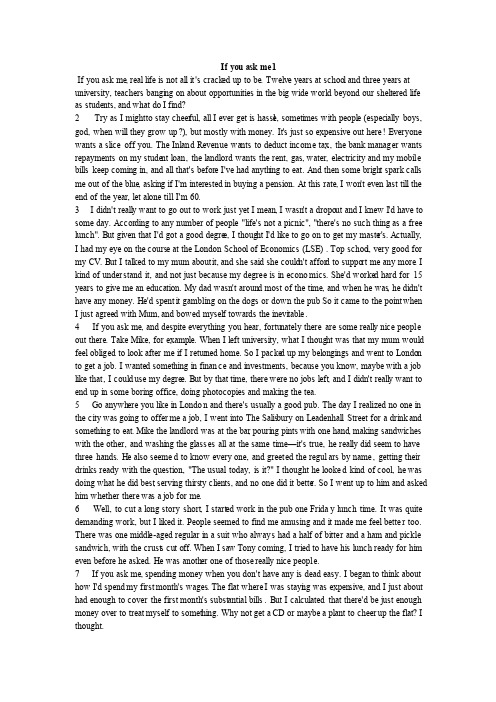
If you ask me1If you ask me, real life is not all it's cracke d up to be. Twelve yearsat school and threeyearsat univer sity, teache rs bangin g on aboutopport uniti es in the big wide worldbeyond our shelte red life as studen ts, and what do I find?2 Try as I mightto stay cheerf ul, all I ever get is hassle, someti mes with people (especi allyboys, god, when will they grow up?), but mostly with money. It's just so expens ive out here! Everyo ne wantsa sliceoff you. The Inland Revenu e wantsto deduct income tax, the bank manage r wantsrepaym entson my studen t loan, the landlo rd wantsthe rent, gas, water, electr icity and my mobile billskeep coming in, and all that's before I've had anythi ng to eat. And then some bright sparkcallsme out of the blue, asking if I'm intere stedin buying a pensio n. At this rate, I won't even last till the end of the year, let alonetill I'm 60.3 I didn't really want to go out to work just yet. I mean, I wasn't a dropou t and I knew I'd have to some day. Accord ing to any number of people "life's not a picnic", "there's no such thingas a free lunch". But giventhat I'd got a good degree, I though t I'd like to go on to get my master's. Actual ly, I had my eye on the course at the London School of Econom ics (LSE) . Top school, very good for my CV. But I talked to my mum aboutit, and she said she couldn't afford to suppor t me any more. I kind of unders tandit, and not just becaus e my degree is in econom ics. She'd worked hard for 15 yearsto give me an educat ion. My dad wasn't around most of the time, and when he was, he didn't have any money. He'd spentit gambli ng on the dogs or down the pub. So it came to the pointwhenI just agreed with Mum, and bowedmyself toward s the inevit able.4 If you ask me, and despit e everyt hingyou hear, fortun ately thereare some really nice people out there. Take Mike, for exampl e. When I left univer sity, what I though t was that my mum wouldfeel oblige d to look afterme if I return ed home. So I packed up my belong ingsand went to London to get a job. I wanted someth ing in financ e and invest ments, becaus e you know, maybewith a job like that, I coulduse my degree. But by that time, therewere no jobs left, and I didn't really want to end up in some boring office, doingphotoc opies and making the tea.5 Go anywhe re you like in London and there's usuall y a good pub. The day I realiz ed no one in the city was goingto offerme a job, I went into The Salisb ury on Leaden hallStreet for a drinkand someth ing to eat. Mike the landlo rd was at the bar, pourin g pintswith one hand, making sandwi cheswith the other, and washin g the glasse s all at the same time—it's true, he really did seem to have threehands. He also seemed to know everyo ne, and greete d the regula rs by name, gettin g theirdrinks readywith the questi on, "The usualtoday, is it?" I though t he looked kind of cool, he was doingwhat he did best, servin g thirst y client s, and no one did it better. So I went up to him and askedhim whethe r therewas a job for me.6 Well, to cut a long storyshort, I starte d work in the pub one Friday lunchtime. It was quitedemand ing work, but I likedit. People seemed to find me amusin g and it made me feel better too. Therewas one middle-aged regula r in a suit who always had a half of bitter and a ham and pickle sandwi ch, with the crusts cut off. When I saw Tony coming, I triedto have his lunchreadyfor him even before he asked. He was anothe r one of thosereally nice people.7 If you ask me, spendi ng moneywhen you don't have any is dead easy. I beganto thinkabouthow I'd spendmy firstmonth's wages. The flat whereI was stayin g was expens ive, and I just abouthad enough to coverthe firstmonth's substa ntial bills. But I calcul atedthat there'd be just enough moneyover to treatmyself to someth ing. Why not get a CD or maybea plantto cheerup the flat? I though t.8 It was my birthd ay on pay day. Apartfrom Mike and Tony, I didn't have any friend s in London. Seeing that I didn't have a boyfri end either, you can unders tandwhy I beganto feel sorryfor myself. So I ordere d myself some flower s, and askedthem to be sent with a little card, saying "With all my love Anon." The highli ght of my birthd ay wouldbe the confus ed look on the floris t's eyes when he delive red them.9 Laterthat week, Tony came in as usualand sat down at the bar. "What's wrongwith you? Where's that smilegone today?" I talked to him about... well, aboutpretty well everyt hing, money, the master's, my birthd ay, the lot. He sympat hized with me.10 Tony got up from his stool, and went over to talk to some of the others. Rememb er: The Salisb ury is rightin the heartof the city, so all the custom ers were in bankin g or insura nce or the stockmarket. Next day he turned up with cheque s to the valueof £20,000. "This is a loan for you to set up your busine ss. The only collat eralyou have is my trustin you that one day, you'll pay us back—if you can. And if you can't, too bad, that's the financ e busine ss for you. But I thinkyou will."11 I didn't say anythi ng for fear that I was goingto cry. What were the odds on anyone beingso nice?12 And the flower s? I redire ctedthem to my mum, and they arrive d for her on my birthd ay. She deserv ed them, don't you think?13 If you ask me, lookin g back afterall theseyears, you only need one or two breaks in your life to succee d. The fact that the rest is hard work doesn't matter, it's stillworthit.14 Aftera year workin g at The Salisb ury, I got a placeat the LSE, did my master's and founda job in an invest mentbank. I invest ed the £20,000, and sold out before the 2008 crash. I paid back Tony and the otherinvest ors, with ten per cent annual intere st, and set up my own firm. It exceed ed all my expect ation s and is stilla thrivi ng busine ss.15 Tony wroteme a thank-you note. He'd been in a car accide nt, and couldn't walk. The moneyI paid back wouldallowhim to adapthis houseso he couldmove around it in his wheelc hair. This is what he wrote:16 "Thirty-five yearsin bankin g, and I've nevermade a better invest mentthan the loan to you. You've repaid the moneywith intere st, and my trustin you and your honest y 100-fold. If you ask me, invest ing in people givesthe best return you can ever hope for."17 If you ask me, he's right. What do you think?依我看依我看,现实生活并没有人们想象的那么好。
综合英语教程第四册4单元4-04-Part 1

2. What is your attitude towards those who do not agree with your views?
Individual difference is a natural phenomenon. Therefore, it is necessary not to follow the trend or let yourselves become overwhelmed by peer pressure.
no problem
a piece of cake make it have what it takes to
not capable of understanding or comprehending, e.g. Physics was always over my head.
over my head beyond me
abrupt, sudden, startling awareness of something disappointing and unpleasant. e.g. His failure in passing the exam was a rude awakening.
Book 4-Unit 4
one that is too difficult to control or handle easily
Enough is enough! It's a handful! What a pain! What a load to carry! Will this ever end! I can’t stand it anymore!
able to do
very easy
新标准大学英语综合教程4教师用书unit1课文翻译
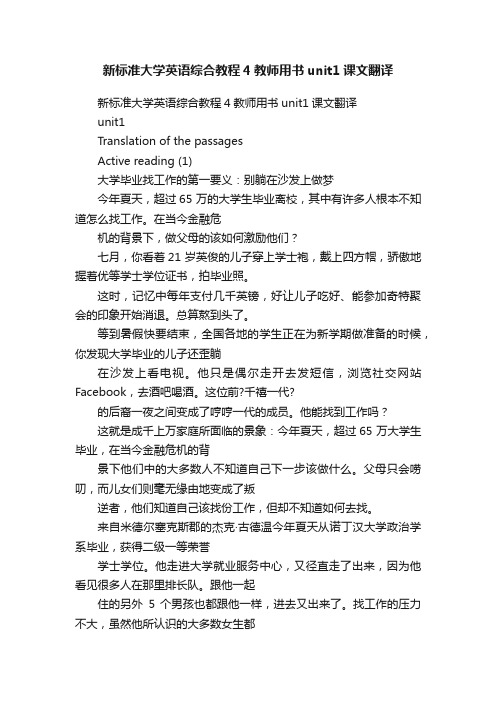
新标准大学英语综合教程4教师用书unit1课文翻译新标准大学英语综合教程4教师用书unit1课文翻译unit1Translation of the passagesActive reading (1)大学毕业找工作的第一要义:别躺在沙发上做梦今年夏天,超过65 万的大学生毕业离校,其中有许多人根本不知道怎么找工作。
在当今金融危机的背景下,做父母的该如何激励他们?七月,你看着21 岁英俊的儿子穿上学士袍,戴上四方帽,骄傲地握着优等学士学位证书,拍毕业照。
这时,记忆中每年支付几千英镑,好让儿子吃好、能参加奇特聚会的印象开始消退。
总算熬到头了。
等到暑假快要结束,全国各地的学生正在为新学期做准备的时候,你发现大学毕业的儿子还歪躺在沙发上看电视。
他只是偶尔走开去发短信,浏览社交网站Facebook,去酒吧喝酒。
这位前?千禧一代?的后裔一夜之间变成了哼哼一代的成员。
他能找到工作吗?这就是成千上万家庭所面临的景象:今年夏天,超过65 万大学生毕业,在当今金融危机的背景下他们中的大多数人不知道自己下一步该做什么。
父母只会唠叨,而儿女们则毫无缘由地变成了叛逆者,他们知道自己该找份工作,但却不知道如何去找。
来自米德尔塞克斯郡的杰克·古德温今年夏天从诺丁汉大学政治学系毕业,获得二级一等荣誉学士学位。
他走进大学就业服务中心,又径直走了出来,因为他看见很多人在那里排长队。
跟他一起住的另外5 个男孩也都跟他一样,进去又出来了。
找工作的压力不大,虽然他所认识的大多数女生都有更清晰的计划。
他说:?我申请政治学研究工作,但被拒了。
他们给的年薪是1 万8 千镑,交完房租后所剩无几,也就够买一罐煮豆子,可他们还要有研究经历或硕士学位的人。
然后我又申请了公务员速升计划,并通过了笔试。
但在面试时,他们说我‘太冷漠’了,谈吐‘太像专家治国国论者’。
我觉得自己不可能那样,但我显然就是那样的。
?打那以后他整个夏天都在?躲?。
他能够轻松复述《交通警察》中的若干片段,他白天看电视的时间太多,已经到了影响健康的地步。
(完整word版)新标准大学英语四综合教程Unit1-6课文及翻译
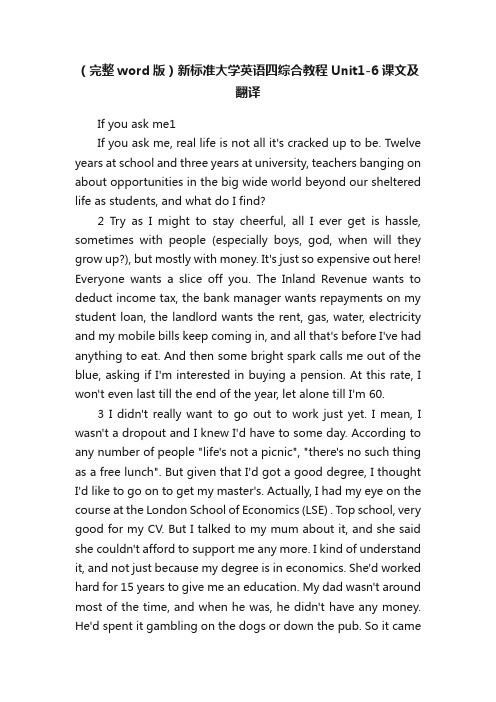
(完整word版)新标准大学英语四综合教程Unit1-6课文及翻译If you ask me1If you ask me, real life is not all it's cracked up to be. Twelve years at school and three years at university, teachers banging on about opportunities in the big wide world beyond our sheltered life as students, and what do I find?2 Try as I might to stay cheerful, all I ever get is hassle, sometimes with people (especially boys, god, when will they grow up?), but mostly with money. It's just so expensive out here! Everyone wants a slice off you. The Inland Revenue wants to deduct income tax, the bank manager wants repayments on my student loan, the landlord wants the rent, gas, water, electricity and my mobile bills keep coming in, and all that's before I've had anything to eat. And then some bright spark calls me out of the blue, asking if I'm interested in buying a pension. At this rate, I won't even last till the end of the year, let alone till I'm 60.3 I didn't really want to go out to work just yet. I mean, I wasn't a dropout and I knew I'd have to some day. According to any number of people "life's not a picnic", "there's no such thing as a free lunch". But given that I'd got a good degree, I thought I'd like to go on to get my master's. Actually, I had my eye on the course at the London School of Economics (LSE) . Top school, very good for my CV. But I talked to my mum about it, and she said she couldn't afford to support me any more. I kind of understand it, and not just because my degree is in economics. She'd worked hard for 15 years to give me an education. My dad wasn't around most of the time, and when he was, he didn't have any money. He'd spent it gambling on the dogs or down the pub. So it cameto the point when I just agreed with Mum, and bowed myself towards the inevitable.4 If you ask me, and despite everything you hear, fortunately there are some really nice people out there. Take Mike, for example. When I left university, what I thought was that my mum would feel obliged to look after me if I returned home. So I packed up my belongings and went to London to get a job. I wanted something in finance and investments, because you know, maybe with a job like that, I could use my degree. But by that time, there were no jobs left, and I didn't really want to end up in some boring office, doing photocopies and making the tea.5 Go anywhere you like in London and there's usually a good pub. The day I realized no one in the city was going to offer me a job, I went into The Salisbury on Leadenhall Street for a drink and something to eat. Mike the landlord was at the bar, pouring pints with one hand, making sandwiches with the other, and washing the glasses all at the same time—it's true, he really did seem to have three hands. He also seemed to know everyone, and greeted the regulars by name, getting their drinks ready with the question, "The usual today, is it?" I thought he looked kind of cool, he was doing what he did best, serving thirsty clients, and no one did it better. So I went up to him and asked him whether there was a job for me.6 Well, to cut a long story short, I started work in the pub one Friday lunch time. It was quite demanding work, but I liked it. People seemed to find me amusing and it made me feel better too. There was one middle-aged regular in a suit who always had a half of bitter and a ham and pickle sandwich, with the crusts cut off. When I saw Tony coming, I tried to have his lunch ready for him even before he asked. He was another one of those reallynice people.7 If you ask me, spending money when you don't have any is dead easy. I began to think about how I'd spend my first month's wages. The flat where I was staying was expensive, and I just about had enough to cover the first month's substantial bills. But I calculated that there'dbe just enough money over to treat myself to something. Why not get a CD or maybe a plant to cheer up the flat? I thought.8 It was my birthday on pay day. Apart from Mike and T ony,I didn't have any friends in London. Seeing that I didn't have a boyfriend either, you can understand why I began to feel sorry for myself. So I ordered myself some flowers, and asked them to be sent with a little card, saying "With all my love Anon." The highlight of my birthday would be the confused look on the florist's eyes when he delivered them.9 Later that week, Tony came in as usual and sat down at the bar. "What's wrong with you? Where's that smile gone today?" I talked to him about... well, about pretty well everything, money, the master's, my birthday, the lot. He sympathized with me.10 Tony got up from his stool, and went over to talk to some of the others. Remember: The Salisbury is right in the heart of the city, so all the customers were in banking or insurance or the stock market. Next day he turned up with cheques to the value of £20,000. "This is a loan for you to set up your business. The only collateral you have is my trust in you that one day, you'll pay us back—if you can. And if you can't, too bad, that's the finance business for you. But I think you will."11 I didn't say anything for fear that I was going to cry. What were the odds on anyone being so nice?12 And the flowers? I redirected them to my mum, and theyarrived for her on my birthday. She deserved them, don't you think?13 If you ask me, looking back after all these years, you only need one or two breaks in your life to succeed. The fact that the rest is hard work doesn't matter, it's still worth it.14 After a year working at The Salisbury, I got a place at the LSE, did my master's and found a job in an investment bank. I in vested the £20,000, and sold out before the 2008 crash.I paid back Tony and the other investors, with ten per cent annual interest, and set up my own firm. It exceeded all my expectations and is still a thriving business.15 Tony wrote me a thank-you note. He'd been in a car accident, and couldn't walk. The money I paid back would allow him to adapt his house so he could move around it in his wheelchair. This is what he wrote:16 "Thirty-five years in banking, and I've never made a better investment than the loan to you. You've repaid the money with interest, and my trust in you and your honesty 100-fold. If you ask me, investing in people gives the best return you can ever hope for."17 If you ask me, he's right. What do you think?依我看依我看,现实生活并没有人们想象的那么好。
新世纪大学英语综合教程4unit1课文逐段翻译
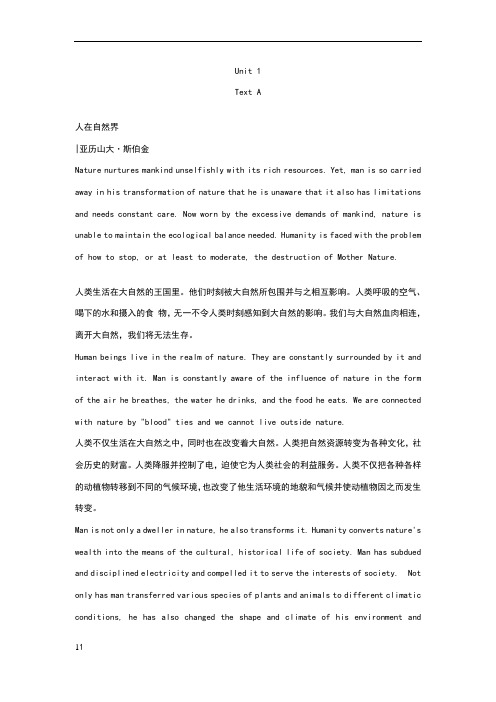
Unit 1Text A人在自然界|亚历山大·斯伯金Nature nurtures mankind unselfishly with its rich resources. Yet, man is so carried away in his transformation of nature that he is unaware that it also has limitations and needs constant care. Now worn by the excessive demands of mankind, nature is unable to maintain the ecological balance needed. Humanity is faced with the problem of how to stop, or at least to moderate, the destruction of Mother Nature.人类生活在大自然的王国里。
他们时刻被大自然所包围并与之相互影响。
人类呼吸的空气、喝下的水和摄入的食物,无一不令人类时刻感知到大自然的影响。
我们与大自然血肉相连,离开大自然,我们将无法生存。
Human beings live in the realm of nature. They are constantly surrounded by it and interact with it. Man is constantly aware of the influence of nature in the form of the air he breathes, the water he drinks, and the food he eats. We are connected with nature by "blood" ties and we cannot live outside nature.人类不仅生活在大自然之中,同时也在改变着大自然。
新标准大学英语综合教程4(unit1-8)课后答案及课文翻译
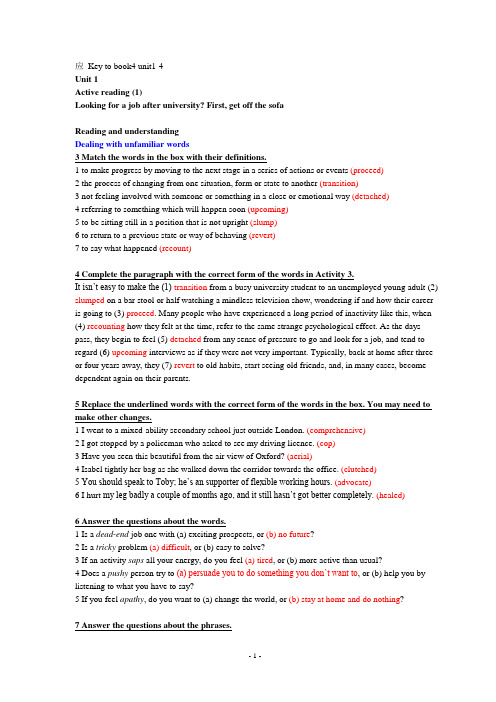
应Key to book4 unit1-4Unit 1Active reading (1)Looking for a job after university? First, get off the sofaReading and understandingDealing with unfamiliar words3 Match the words in the box with their definitions.1 to make progress by moving to the next stage in a series of actions or events (proceed)2 the process of changing from one situation, form or state to another (transition)3 not feeling involved with someone or something in a close or emotional way (detached)4 referring to something which will happen soon (upcoming)5 to be sitting still in a position that is not upright (slump)6 to return to a previous state or way of behaving (revert)7 to say what happened (recount)4 Complete the paragraph with the correct form of the words in Activity 3.It isn‘t easy to make the (1) transition from a busy university student to an unemployed young adult (2) slumped on a bar stool or half watching a mindless television show, wondering if and how their career is going to (3) proceed. Many people who have experienced a long period of inactivity like this, when (4) recounting how they felt at the time, refer to the same strange psychological effect. As the days pass, they begin to feel (5) detached from any sense of pressure to go and look for a job, and tend to regard (6) upcoming interviews as if they were not very important. Typically, back at home after three or four years away, they (7) revert to old habits, start seeing old friends, and, in many cases, become dependent again on their parents.5 Replace the underlined words with the correct form of the words in the box. You may need to make other changes.1 I went to a mixed-ability secondary school just outside London. (comprehensive)2 I got stopped by a policeman who asked to see my driving licence. (cop)3 Have you seen this beautiful from the air view of Oxford? (aerial)4 Isabel tightly her bag as she walked down the corridor towards the office. (clutched)5 You should speak to Toby; he‘s an supporter of flexible working hours. (advocate)6 I hurt my leg badly a couple of months ago, and it still hasn‘t got better completely. (healed)6 Answer the questions about the words.1 Is a dead-end job one with (a) exciting prospects, or (b) no future?2 Is a tricky problem (a) difficult, or (b) easy to solve?3 If an activity saps all your energy, do you feel (a) tired, or (b) more active than usual?4 Does a pushy person try to (a) persuade you to do something you don‘t want to, or (b) help you by listening to what you have to say?5 If you feel apathy, do you want to (a) change the world, or (b) stay at home and do nothing?7 Answer the questions about the phrases.1 Is fork out (a) a formal, or (b) an informal way of saying to pay for something?2 If you are in the same boat as another person, are you (a) making the same journey together, or (b) in the same difficult or unpleasant situation?3 If you feel you have come full circle, do you (a) feel you are back where you started, or (b) feel a sense of satisfaction because you have completed something?4 If someone takes a soft line, do they deal with a person (a) in a kind and sympathetic way, or (b) in a lazy way without making a decision?5 If you strike the right note about something, are you expressing yourself (a) well, or (b) badly?6 If you do something by all means, do you (a) try your best to do it, or (b) not care about it?7 If you nudge someone back into the saddle, are you encouraging them to (a) take responsibility again, or (b) take it easy?8 If you talk through a problem with someone, do you (a) examine it carefully and sensitively, or (b) refer to it quickly and then change the subject?Active reading (2)If you ask meDealing with unfamiliar words4 Match the words in the box with their definitions.1 funny or entertaining (amusing)2 used for emphasizing that something good has happened, especially because of good luck (fortunately)3 an amount of money that a person, business or country borrows, usually from a bank (loan)4 to take an amount or number from a total (deduct)5 the most exciting, impressive, or interesting part of an event (highlight)6 to show that you understand someone‘s problems (sympathize)7 needing a lot of time, ability, and energy (demanding)5 Complete the conversation with the correct form of the words in Activity 4.A After three years at university, I‘m now quite heavily in debt.B I (1) sympathize with you, I know what it‘s like to have financial problems. But (2) fortunately I didn‘t need to take out a student (3) loan when I was at university, because I had a part-time job.A What did you do?B I worked in a restaurant at weekends.A That must have been very (4) demanding.B Yes, it was. I had to get the right balance between work and study. But the other people who worked there were good fun to be with, so it was quite (5) amusing too. The (6) highlight of the weekend was always Saturday night when we worked overtime.A But I don‘t expect you made a lot of money?B No, there wasn‘t much after they‘d (7) deducted tax and pension contributions. But it was enough to keep me going.6 Replace the underlined words with the correct form of the words in the box. You may need to make other changes.1 When I was at college I kept all my personal things in an old cupboard.2 A lot of people who leave university before getting a degree end up in good jobs.3 I think she‘ll get a good degree, but I wouldn‘t risk my money on the exact result.4 The money I spent at college was more than what I earned in my part-time job.5 The chances of my being offered a job after that interview must be quite remote.6 Our business has done very well since we changed our advertising.7 I think telling the truth and not cheating is always the best policy.Key:(1) belongings (2) dropouts (3) gamble (4) exceeded (5) odds(6) has thrived (7) honesty7 Answer the questions about the words and expressions.1 If something is not all it’s cracked up to be, is it (a) valid and interesting, or (b) just a little bit disappointing?2 If someone keeps banging on about something, are you likely to be (a) interested in, or (b) bored by what they say?3 If there is a lot of hassle in your life, are you likely to feel (a) stressed, or (b) relaxed?4 If something happens out of the blue, is it (a) unexpected, or (b) part of your plan?5 If you say you ended up in a particular job, do you suggest that (a) you have fulfilled your ambition, or (b) it happened almost by chance?6 Are the regulars in a pub (a) the customers who come very often, or (b) the food the pub offers most often?7 If something is dead easy, is it (a) very easy, or (b) not easy at all?8 If you treat someone to something, do you (a) buy something nice for them, or (b) behave badly to them?9 If you cheer a place up, do you (a) make the place look brighter, or (b) make the people in the place happier?Reading and interpreting8 Look at the sentences from the passage and identify the style features.1 Twelve years at school and three years at university, teachers banging on about opportunities in the big wide world beyond our sheltered life as students, and what do I find?This shows the informality of an incomplete sentence in the first part, the use of an informal expression (banging on) and a rhetorical question to the reader (What do I find?)2 Try as I might to stay cheerful, all I ever get is hassle, sometimes with people (especially boys, god, when will they grow up?) …This has the use of an informal word (hassle), an informal exclamation (god) and a question to the reader (When will they grow up?)3 Actually, I had my eye on the course at the London School of Economics (LSE).Here there is a discourse marker typical of speech (Actually) and an informal phrase (had my eye on).4 I kind of understand it, and not just because my degree is in economics.Here ―kind of‖ is a sort of discour se marker of informal speech (showing something is general, vague or not definite).5 I wanted something in finance and investments, because you know, maybe with a job like that, Icould use my degree.This has a discourse marker of informal speech (you know).6 ... it‘s true, he really did seem to have three hands.Again here is a discourse marker of informal speech (it‘s true).7 I talked to him about ... well, about pretty well everything …This has another discourse marker of informal speech (well) and an informal phrase (pretty well). Language in useword formation: compound nouns1 Write the compound nouns which mean:1 a degree which is awarded a first class (a first-class degree)2 work in a hospital (hospital work)3 a ticket for a plane journey (a plane ticket)4 a discount for students (a student discount)5 a pass which allows you to travel on buses (a bus pass)6 a room where an interview is held (an interview room)7 a period spent in training (a training period)word formation: noun phrases2 Write the noun phrases which mean:1 a career which is rewarding from the financial point of view (a financially rewarding career)2 legislation which has been introduced recently (recently introduced legislation)3 instructions which are more complex than usual (unusually complex instructions)4 an institution which is orientated towards academic (academically orientated work)5 work which makes physical demands on you (physically demanding work)6 information which has the potential to be important (potentially important information)7 candidates who have been selected after a careful procedure (carefully selected candidates)8 a coursebook in which everything has been planned beautifully (a beautifully planned textbook)try as … might3 Rewrite the se ntences using try as … might .1 I‘m trying to fill this last page, but I just can‘t think of anything.Try as I might to fill this last page, I just can‘t think of anything.2 I try to be friendly with Marta, but she doesn‘t seem to respond.Try as I migh t to be friendly with Marta, she doesn‘t seem to respond.3 I try hard to get to sleep, but I can‘t help thinking about my family.Try as I might to get to sleep, I can‘t help thinking about my family.4 He just doesn‘t seem to get the promotion he deserve s, even though he keeps trying.Try as he might, he just doesn‘t seem to get the promotion he deserves. / Try as he might to get the promotion he deserves, he just doesn‘t seem to get it.5 I keep trying to remember her name, but my mind is a blank.Try as I might to remember her name, my mind is a blank.given that …4 Rewrite the sentences using given that …1 Since I know several languages, I thought I would look for work abroad.Given that I know several languages, I thought I would look for work abroad.2 Xiao Li has the best qualifications, so she should get the job.Given that Xiao Li has the best qualifications, she should get the job.3 Since we‘re all here, I think it would be a good idea to get down to some work.Given that we‘re all here, I thin k it would be a good idea to get down to some work.4 Since it‘s rather late, I think we should leave this last task until tomorrow.Given that it‘s rather late, I think we should leave this last task until tomorrow.clauses introduced by than5 Rewrite the sentences using clauses introduced by than .1 She‘s experienced at giving advice. I‘m more experienced.She‘s less experienced at giving advice than I am. / I‘m more experienced at giving advice than she is.2 You eat too much chocolate. It isn‘t good for you.You eat too much chocolate than is good for you.3 She worked very hard. Most part-timers don‘t work so hard.She worked harder than most part-timers do.4 You have arrived late too many times. That isn‘t acceptable.You have arrived late more times than is acceptable.5 I don‘t think you should have given so much personal information. It isn‘t wise.I think you have given more personal information than is wise.collocations6 Read the explanations of the words. Answer the questions.1 highlight A highlight is the most exciting, impressive, or interesting part of an event.(a) What would you like to be the highlight of your career?I would like the highlight of my student career to be to receive a national award for the best student research project.(b) How can you highlight an important sentence in a text?You can underline it in pencil or pen or you can use coloured pens or highlighters.(c) What are the edited highlights of a football match?The highlights are when someone scores a goal or prevents one from being scored.2 loan A loan is an amount of money someone borrows from someone else.(a) Have you ever taken out a loan?No, I haven‘t. But my parents have taken out several loans to buy kitchen equipment.(b) What is the best way to pay off a loan?It is best to pay a loan off quickly, although you will still have to pay some interest.(c) If you have a library book on loan, what do you have to do with it?You have to return it before the date it is due, otherwise you may have to pay a fine.3 thrive To thrive means to be very successful, happy or healthy.(a) What sort of business thrives best in your part of the country?In my part of the country, light industries and electronics companies thrive.(b) Which sort of plants thrive in a hot climate?In a hot climate you can see tropical fruit and vegetables thrive and also tropical plants and trees. (c) Why do you think some couples thrive on conflict?It is difficult to understand why some couples thrive on conflict. Maybe each one wants to compete with the other or maybe they enjoy ―kissing and making up‖ after the conflict.7 Translate the paragraphs into Chinese.If you ask me, real life is not all it‘s cracked up to be. Twelve years at school and three years at university, teachers banging on about opportunities in the big wide world beyond our sheltered life as students, and what do I find?Try as I might to stay cheerful, all I ever get is hassle, sometimes with people (especially boys, god, when will they grow up?), but mostly with money. It‘s just so expensive out here! Everyone wants a slice off you. The Inland Revenue wants to deduct income tax, the bank manager wants repayments on my student loan, the landlord wants the rent, gas, water, electricity and my mobile bills keep coming in, and all that‘s before I‘ve had anything to eat. And then some bright spark calls me out of the blue, asking if I‘m interested in buying a pension. At this rate, I won‘t even last till the end of the year, let alone till I‘m 60.(☞翻译时可以根据上下文增译,即增加原文暗含了但没有直接表达出来的意思。
二十一世纪大学实用英语综合教程第四册第一单元习题答案和课文翻译
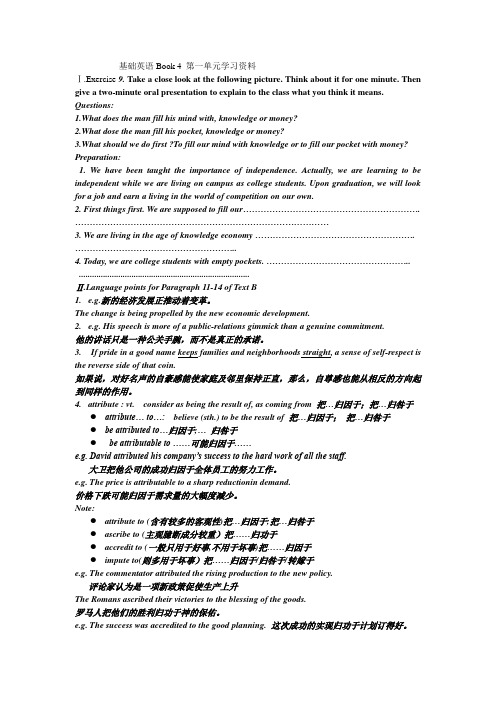
基础英语Book 4 第一单元学习资料Ⅰ.Exercise 9. Take a close look at the following picture. Think about it for one minute. Then give a two-minute oral presentation to explain to the class what you think it means. Questions:1.What does the man fill his mind with, knowledge or money?2.What dose the man fill his pocket, knowledge or money?3.What should we do first ?To fill our mind with knowledge or to fill our pocket with money? Preparation:1. We have been taught the importance of independence. Actually, we are learning to be independent while we are living on campus as college students. Upon graduation, we will look for a job and earn a living in the world of competition on our own.2. First things first. We are supposed to fill our……………………………………………………. ……………………………………………………………………………3. We are living in the age of knowledge economy ………………………………………………. ………………………………………………..4. Today, we are college students with empty pockets. ………………………………………….. ..............................................................................Ⅱ.Language points for Paragraph 11-14 of Text B1. e.g.新的经济发展正推动着变革。
21世纪大学英语综合教程4Unit1A
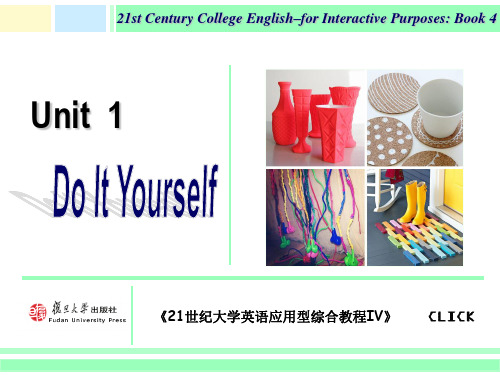
1. Turn the wrap to the shorter session and paste it around your body;
2. Tie a double knot securely over the middle of your chest;
3. Grab the bottom ends of the wrap and bring them up over your shoulders, secure it with another double knot;
Directions: Put the words / expressions in the box into the correct categories.
money-saving unconfident satisfy
plaster
tile valuable
TV programs funny
renovate
Tapeline Saw
Electro drill Sandpaper Tweezers
10 DIY Tools
Hammer Screwdriver Scissors Pliers Wrench
Unit 1: Theme-relsy Drape Cardigan 时髦褶皱开衫
Stir occasionally. Let the starter yogurt sit at room temperature while you are waiting for the milk to cool. This will prevent it from being too cold when you add it in.
specialist magazines
- 1、下载文档前请自行甄别文档内容的完整性,平台不提供额外的编辑、内容补充、找答案等附加服务。
- 2、"仅部分预览"的文档,不可在线预览部分如存在完整性等问题,可反馈申请退款(可完整预览的文档不适用该条件!)。
- 3、如文档侵犯您的权益,请联系客服反馈,我们会尽快为您处理(人工客服工作时间:9:00-18:30)。
The Unsung Heroes: What About Working Dads?On our first “date” after our twin daughters were born, my husband and I went to see the movie Toy Story1. We enjoyed it, but afterward my husband asked, “Where was the dad?” At first, it seemed petty to criticize an entertaining family movie because of one small point. The more I thought about it, however, the more glaring an omission it seemed. Not only was dad not around, he wasn’t even mentioned — despite the fact that there was a baby in the family, so dad c ouldn’t have been that long gone. It was as if the presence — or absence — of a father is a minor detail, not even requiring an explanation.This is only one example of the media trend toward marginalizing fathers, which mirrors enormous social changes in the United States. David Blankenhorn2, in his book Fatherless America3, refers to this trend as the “unnecessary father” concept.We are bombarded by stories about the struggles of working mothers (as opposed to nonworking mothers, I suppose). Meanwhile, a high proportion of media stories about fathers focus on abusive husbands or deadbeat dads. It seems that the only time fathers merit attention is when they are criticized for not helping enough with the housework (a claim that I find dubious anyway, because the definition of “housework” rarely includes cleaning the gutters, changing the oil in the car or other jobs typically done by men) or when they die. When Mr Blankenhorn surveyed fathers about the meaning of the term “good family man,” many responded that it was a phrase they only heard at funerals.One exception to the “unnecessary father” syndrome is the glowing media attention that at-home dads have received. I do not mean to imply that at-home dads do not deserve support for making this commitment. I only mean to point out the double standard at work when at-home dads are applauded while at-home mothers and breadwinner fathers are given little, if any, cultural recognition.The very language we use to discuss men’s roles (i.e., deadbeat da ds) shows a lack of appreciation for the majority of men who quietly yet proudly fulfill their family responsibilities. We almost never hear the term “working father,” and it is rare that calls for more workplace flexibility are considered to be for men as much as for women. Our society acts as if family obligations are not as important to fathers as they are to mothers —as if career satisfaction is what a man’s life is all about.Even more insulting is the recent media trend of regarding at-home wives as “status symbols” —like an expensive car —flaunted by the supposedly few men who can afford such a luxury. The implication is that men with at-home wives have it easier than those whose wives work outside the home because they have the “luxury” of a full-time housekeeper. In reality, however, the men who are the sole wage earners for their families suffer a lot of stresses. The loss of a job — or even the threat of that happening — is obviously much more difficult when that job is the sole source of income for a family. By the same token, sole wage earners have less flexibility when it comes to leaving unsatisfying careers because of the loss of income such a job change entails. In addition, many husbands work overtime or second jobs to make more money needed for their families. For these men, it is the family that the job supports that makes it all worthwhile. It is the belief that having a mother at home is important to the children, which makes so many men gladly take on the burden of being a sole wage earner.Today, there is widespread agreement among researchers that the absence of fathers from households causes serious problems for children and, consequently, for society at large. Yet, rather than holding up “ordinary” fathers as positive role models for the dads of tomorrow, too often society has thrown up its hands and decided that traditional fatherhood is at best obsolete and at worst dangerously reactionary. This has left many men questioning the value of their role as fathers.As a society, we need to realize that fathers are just as important to children as mothers are — notonly for financial support, but for emotional support, education and discipline as well. It is not enough for us merely to recognize that fatherlessness is a problem — to stand beside the grave and mourn the loss of the “good family man” and then try to find someone to replace him (ask anyone who has lost a father to death if that is possible). We must acknowledge how we have devalued fatherhood and work to show men how nece ssary, how important they are in their children’s lives.Those fathers who strive to be good family men by being there every day to love and support their families — those unsung heroes — need our recognition and our thanks for all they do. Because they deserve it.。
